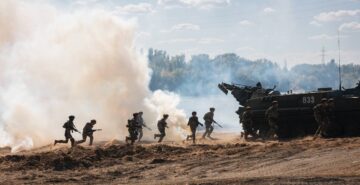

Why the Russian unified history textbook violates international law or a new dimension of propaganda in the occupied territories
In 2023, the Russian Federation released the updated textbook on the history of Russia for 10-11 grades, which became the subject matter for the study by the expert community, which analyzed in detail the content on this textbook and the messages that Russia is trying to impose on children in Russia and in the territories occupied by it. Denying the existence of Ukraine, inciting hatred against peoples (including indigenous peoples and national minorities), supporting the Russian-Ukrainian war and preparing children for the war against “Nazism” during the “Special Military Operation” (because that is what Russian propagandists call the Russian-Ukrainian war) – these are just a few of the things that children have to not only study at schools, but also choose appropriate answer options for the test tasks during the Russian “EGE” (Unified State Exam, a Russian analogue of the Ukrainian ZNO – External Independent Evaluation).
While focusing on all these definitely problematic points, it is important not to lose sight of the key point – the form through which all these messages are being broadcast to Ukrainian children in the temporarily occupied territories, namely the unified history textbook, the content of which is fully controlled by the current government of the Russian Federation. It was reported that more than 750,000 copies were distributed throughout the Russian Federation, and the Russians include the temporarily occupied territories of Donetsk, Luhansk, Zaporizhzhia and Kherson regions in these numbers. The textbook, edited by the former Minister of Culture of the Russian Federation and the current assistant to the advisor of the President of the Russian Federation on military history – Vladimir Medinsky, and the rector of the “MGIMO” (Moscow State Institute of International Relations) – Anatoly Torkunov, is in fact an irreplaceable source of knowledge for schoolchildren, because Ukrainian books are being removed from the libraries as a part of “Denazification of history”, and the access to foreign and Ukrainian web resources is blocked by the occupation authorities. Therefore, it is important not only to pay attention to the content of this textbook, but also to the very fact of the existence of only source of “historical truth” – according to the top leadership of the Russian Federation. But even the very fact of the existence of the “unified textbook” and its distribution in the occupied territories is a violation of the right of Ukrainian children to education.
History textbooks: history and modernity
For the first time, the connection between the narratives in textbooks and wars, was discussed at the international level during the League of Nations (1919-1946) within the Committee on Intellectual Cooperation. The textbooks had to be freed from nationalistic and one-sided interpretations, and most importantly – the narratives laid down by the authors were to contribute to reconciliation and support of peace between peoples. In 1937, a special declaration on the study of history was adopted, but unfortunately its provisions remained declared purely on a paper. Instead, in Nazi Germany (as well as in the Soviet Union and a number of other totalitarian states), state-approved textbooks were actively used as a means of spreading propaganda among children and youth, including the war propaganda through the “great historical past”. The distribution of these narratives also contributed to the beginning of the World War II and its tragic consequences for the entire world.
After the end of the World War II and during the discussion of the Universal Declaration of Human Rights, the representative of the World Jewish Congress Alex Easterman proposed to add paragraph 2 to Article 26, which stipulates that education shall be directed to the full development of the human personality and to the strengthening of respect for human rights and fundamental freedoms. It shall promote understanding, tolerance and friendship among all nations, racial or religious groups, and shall further the activities of the United Nations for the maintenance of peace.
He justified his position by the fact that education was one of the main factors of the two World Wars, and therefore the right to education should not be simplified to purely technical aspects of access to educational institutions. In addition, this provision was supposed to serve as a lever that would make it impossible for the state to use education to instill a specific ideology. Therefore, the introduction of education directions became the marker that determined the content of educational programs and was supposed to protect children from the indoctrination by the state.
In 1946, during the first UNESCO General Conference, the “Program for the improvement of textbooks and teaching materials as aids to international understanding” was approved. The role of education in building peace and overcoming conflicts was increasingly mentioned in international documents, and in 2013, the acting rapporteur on cultural rights (for that time) Farida Shaheed published a study on the teaching history,, in which she comprehensively examined the issue of textbooks and the unified history textbook – a concept, which operates in Russia and in the territories occupied by it since 2023.
A unified history textbook is incompatible with the right to education.
In Farida Shaheed’s study, a whole chapter is devoted to the issue of history textbooks, because they are an important instrument in the hands of governments for delivering the official historical narrative to students. In countries where history is taught according to the unified narrative, textbooks are considered to be a crucial instrument for delivering government messages to the widest possible audience. Such a unified narrative is the updated Russian state federal standard, which sets requirements for teaching subjects of the humanitarian cycle, including history. For example, as a result of studying history, students should acquire a “sense of pride for Russia”, “readiness to serve” Russia, and feel the “responsibility for its fate”. These standards will be implemented from September 1, 2023, in all Russia-occupied territories of Ukraine.
Having the unified history textbook inevitably promotes the monopoly of one narrative over all others, especially when laws and regulatory acts do not provide for open tenders that allow competition between textbooks. In the Russian Federation, there are no such tenders, and textbooks for children are written by propagandists loyal to the government, such as former Minister of Culture Vladimir Medinsky, who is called one of the ideologists of the modern “Ruscism” – they say that he is the one who writes Putin’s pseudohistorical articles, such as the 2021 article about the “historical unity of Ukrainians and Russians”. In addition, in the Russian Federation, history is used as one of the means of mass propaganda to influence people’s consciousness. In the context of the temporarily occupied Ukrainian territories, it is important to mention the infamous extracurricular course “Russia – my history”, which contains such modules as “Banderization of post-war Ukraine”, and children are told about the “glorification of neo-Nazism in modern Ukraine”.
In addition, having the unified historical narrative promoted through the unified textbook deprives children of the right to develop their own historical perspective in the learning process, which is an integral part of the right to education. The Russian unified historical narrative, which is introduced among Ukrainian children in the temporarily occupied territories, de-facto incites hatred towards Ukrainians and Ukraine calling it “neo-Nazi state”, distorts the nature of the Russian-Ukrainian war calling it “continuation of fight against Nazism”, and denies the fact of Ukraine’s existence as such – because according to the version of Russian propagandists Ukraine was invented by the Austro-Hungarians to harm Russia. The unified textbook plays a key role in this process – when Ukrainian textbooks and books are removed from the libraries in the temporarily occupied territories , when the access to independent sources is blocked, and books about the genocide of Ukrainians are included in the list of extremist materials, people are actually deprived of access to alternative sources of information. Children, due to the peculiarities of their psyche, are especially vulnerable to propaganda, and for this purpose, the Russians are preparing new versions of the textbook: by September 2024, new unified textbooks for students of 5-9 grades should appear. It should be noted that the corresponding narratives and objectives are already included in educational programs, and unified textbooks should consolidate and strengthen their harmful effect on Ukrainian children, if occupied territories are not liberated in the shortest possible time.
Textbook as a weapon
The Russian Federation no longer hides the fact that it uses education as a weapon for future generations, who, from a very young age, must prepare to die in the name of “great Russia”. Therefore, the silence of international organizations, which are supposed to monitor Russia’s implementation of ensuring the right to education of children under its jurisdiction, including Ukrainian children under the occupation of the Russian Federation, seems strange. This also applies to the above-mentioned Farida Shaheed, who has been the UN Special Rapporteur on the right to education since 2022, and has never once paid attention to how Russia distorts the very essence of the right to education. Moreover, the narratives distributed through the unified history textbook (the very existence of which is a violation of the right to education, and not only in the context of the temporarily occupied territories, and which definitely does not promote the “activities of the United Nations on supporting peace”), are illegal from the point of view of Russia’s obligations under international law. Instead, Ukrainian children are being prepared to for a war against their own state, teaching them to be proud of Russian military victories and to be ready to fight against Russia’s enemies, which includes not only Ukraine, but also the entire “collective West” along with the countries of the NATO bloc. Therefore, it is important to be ready now not only for the military de-occupation, but also for the work on overcoming the harmful influence of Russian “soft weapons”, which are already trying to destroy Ukrainian identity in the seized territories.
The article was prepared by the Centre of civil education “Almenda” as a part of the project “Steps towards each other: approaching the re-integration of youth from the temporarily occupied territories”. The project is implemented with the financial support of the Ministry of Foreign Affairs of the Czech Republic as a part of the Transition Promotion Program. The views represented in this material belong to authors and do not reflect the official position of the Ministry of Foreign Affairs of the Czech Republic



